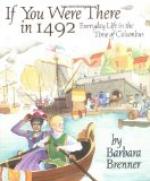Light on shore.
Now, indeed, they must be close to land. The sun went down upon the same weary round of waters which for so long a time their eyes had ached to see beyond, when, at ten o’clock, Columbus, standing on the poop of his vessel, saw a light, and called to him, privately, Pedro Gutierrez, a groom of the king’s chamber, who saw it also. Then they called Rodrigo Sanchez, who had been sent by their highnesses as overlooker. I imagine him to have been a cold and cautious man, of the kind that are sent by jealous states to accompany and curb great generals, and who are not usually much loved by them. Sanchez did not see the light at first, because, as Columbus says, he did not stand in the place where it could be seen; but at last even he sees it, and it may now be considered to have been seen officially. “It appeared like a candle that went up and down, and Don Christopher did not doubt that it was true light, and that it was on land; and so it proved, as it came from people passing with lights from one cottage to another.”
The promised pension.
Their highnesses had promised a pension of ten thousand maravedis to the fortunate man who should see land first. The “Pinta” was the foremost vessel; and it was from her deck, at two o’clock in the morning, that land was first seen by Rodrigo de Triana. We cannot but be sorry for this poor common sailor, who got no reward, and of whom they tell a story, that in sadness and despite, he passed into Africa, after his return to Spain, and became a Mahometan. The pension was adjudged to the admiral: it was charged, somewhat ominously, on the shambles of Seville, and was paid him to the day of his death; for, says the historian Herrera, “he saw light in the midst of darkness, signifying the spiritual light which was introduced amongst these barbarous people, God permitting that, the war being finished with the Moors, seven hundred and twenty years after they had set foot in Spain, this work (the conversion of the Indians) should commence, so that the Princes of Castille and Leon might always be occupied in bringing infidels to the knowledge of the Holy Catholic faith.”
Religious MOTIVIES.
These last words are notable. They are such as Columbus himself would probably have made use of in describing this, the crowning event of his life. In the preface to his diary, which is an address to Ferdinand and Isabella, he speaks at large of the motives of their highnesses. He begins by saying how, in this present year of 1492, their highnesses had concluded their war with the Moors, having taken the great city of Granada, at the siege of which he was present, and saw the royal banners placed upon the towers of the Alhambra. He then tells how he had given information to their highnesses of the lands of India, and of a prince, called the Grand Khan, who had sent ambassadors to Rome, praying for




